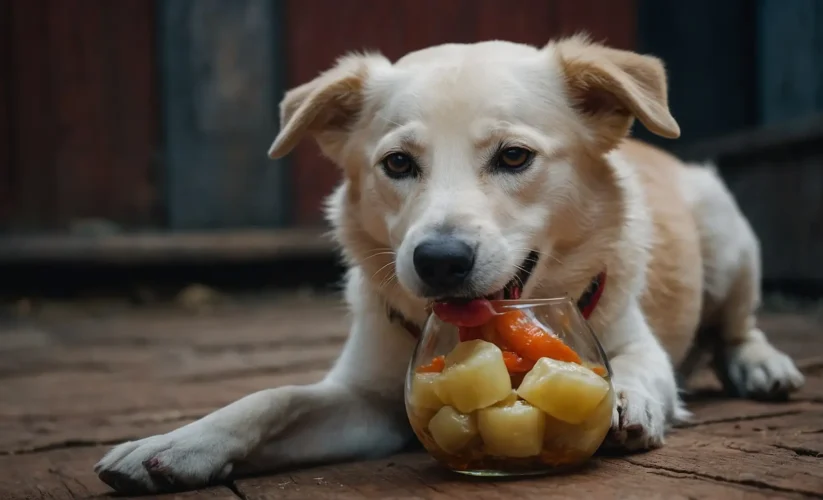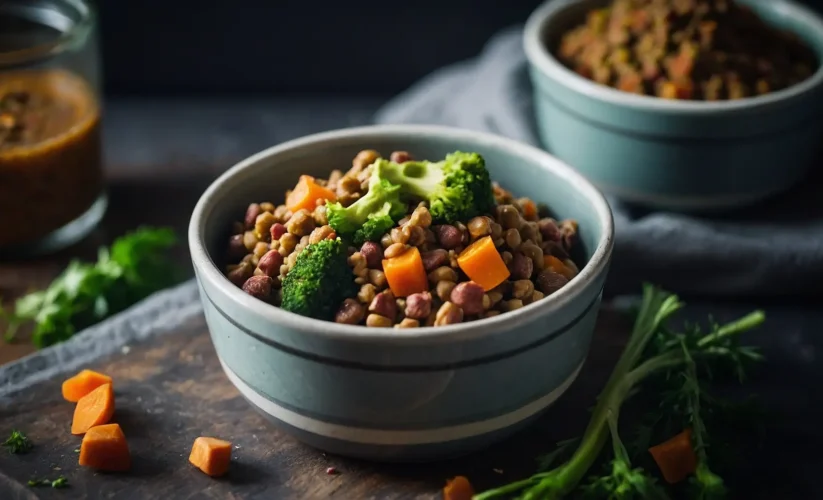can dogs eat pickled ginger?

Ginger, in its natural form, is known for its health benefits in humans, ranging from anti-inflammatory properties to digestive aid. When it comes to our canine companions, the question of “can dogs eat pickled ginger?” becomes more complex due to the additional ingredients involved in the pickling process. Pickled ginger, often served as a palate cleanser with sushi, is ginger root that has been marinated in a solution of vinegar and sugar. This process alters the natural state of ginger, adding layers to the question of its safety and benefits for dogs.
Understanding the dietary needs and restrictions of dogs is crucial. Their digestive systems are markedly different from humans’, making some human-safe foods potentially harmful to them. The exploration of whether pickled ginger is good or bad for dogs requires a nuanced approach, considering not just the ginger itself but also the substances it’s combined with during pickling.
Is Pickled Ginger Good for Dogs?
To address the question of “can dogs eat pickled ginger?” from a positive angle, let’s first consider the benefits of ginger. Ginger contains antioxidants and is known for its anti-inflammatory properties, which can be beneficial for dogs with joint pain or digestive issues. However, when ginger is pickled, the amount that a dog can safely consume becomes a critical factor due to the added ingredients like vinegar and sugar.
In small amounts, pickled ginger could potentially offer some health benefits to dogs, such as aiding in digestion and helping to alleviate nausea. For dogs with motion sickness or those undergoing chemotherapy, ginger has been recommended in moderation to help manage symptoms.
Is Pickled Ginger Bad for Dogs?
However, the flip side of the coin presents several risks. The primary concern with feeding dogs pickled ginger lies in the vinegar and high sugar content used in the pickling process. These ingredients can upset a dog’s digestive system, leading to issues like diarrhea and vomiting. Additionally, the acidity of vinegar might be harsh on a dog’s stomach, and the sugar content can contribute to weight gain and dental problems.

Moreover, some pickled gingers contain artificial sweeteners like xylitol, which is toxic to dogs and can lead to severe health issues, including liver failure and hypoglycemia. It’s also important to consider the sodium content, as high sodium levels are harmful to dogs, potentially leading to sodium ion poisoning.
Are Other Foods Safe for Dogs?
In light of the concerns associated with pickled ginger, dog owners might wonder about safer alternatives. When considering human foods that are safe for dogs, it’s essential to focus on those that provide nutritional benefits without the risks posed by added ingredients. Plain, cooked vegetables such as carrots, green beans, and sweet potatoes can be excellent treats. Additionally, fruits like apples (without the seeds) and blueberries offer antioxidants and vitamins beneficial to a dog’s health.
When introducing any new food into your dog’s diet, it’s vital to do so gradually and observe for any adverse reactions. Consulting with a veterinarian before adding human foods to your dog’s diet is always recommended to ensure they align with your pet’s specific dietary needs.
Final Thoughts
The inquiry into “can dogs eat pickled ginger?” brings us to a nuanced conclusion. While ginger itself possesses health benefits that can extend to dogs, the pickling process introduces elements that might not be suitable for all dogs. The key takeaway is moderation and caution. If you decide to offer your dog a small piece of pickled ginger, ensure it does not contain any harmful additives like xylitol and is low in sodium.
Ultimately, the safest approach is to prioritize foods specifically formulated for dogs or to choose human foods known to be safe and beneficial for canine health. Remember, every dog is an individual with unique dietary needs and tolerances. What works for one dog might not work for another, underscoring the importance of personalized advice from a veterinary professional. Sharing your life with a dog is a journey filled with learning and love, and part of that journey is ensuring their diet supports a long, happy, and healthy life together.










